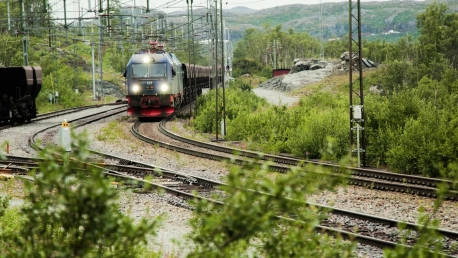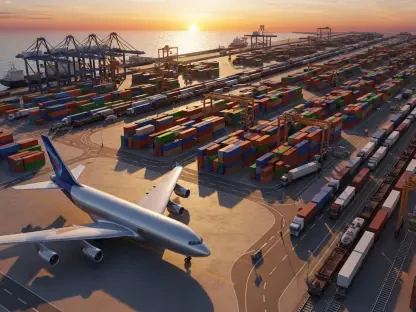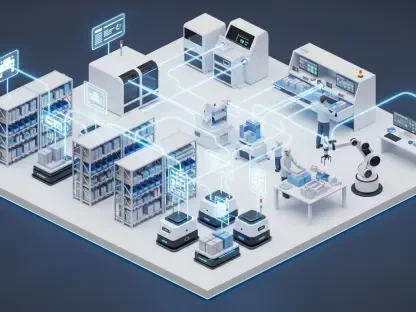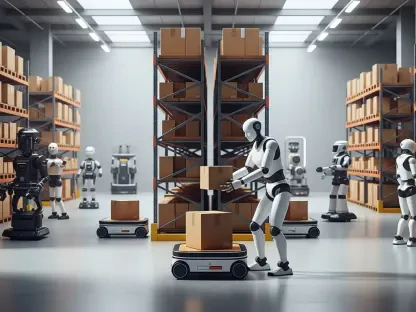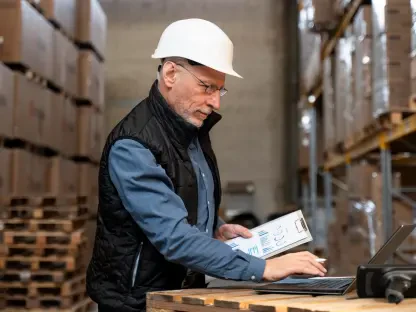The rail freight sector is on the brink of a revolution, marked by relentless strides toward sustainability and improved efficiency. This period of innovation and commitment showcases the global rail industry’s unwavering dedication to ecological stewardship and advancements in technology. These efforts not only aim to diminish carbon emissions but also to enhance the robustness of the supply chain, ensuring a greener and more efficient future in freight transportation.
Rail Companies Partner for Environmental Goals
Pinsly Railroad Company’s Initiative
Pinsly Railroad Company is leading the charge in environmental conservation. Their Florida Gulf & Atlantic Railroad and Grenada Railroad have partnered with the US Environmental Protection Agency, joining the SmartWay Transport Partnership. Under CEO Ryan Ratledge’s guidance, their environmental agenda is multifaceted – focusing not just on transitioning freight transport from road to rail for efficiency but also on tactics to lower and offset emissions from their locomotives. This exemplifies a comprehensive approach to sustainability, looking at the impact of transportation holistically.The initiative speaks volumes about their commitment to the environment and the broader emissions reduction strategy that is taking hold across the rail industry. It foregrounds the need for continuous innovation in practices and the embracing of partnerships to achieve substantial impacts in the battle against climate change, making Pinsly Railroad Company an exemplary leader in this critical mission.
KiwiRail’s Infrastructure Evolution
On the shores of New Zealand, KiwiRail is recalibrating the future of its rail infrastructure. The decision to strategically defer the reactivation of the line linking Kauri to Otiria is not a setback but a progressive step. It allows for the seamless integration with the forthcoming design work of the Marsden Point Rail Link, representing meticulous planning and responsiveness to community needs.Deferring the project has enabled KiwiRail to prioritize current needs such as repairing sections damaged by storms, while keeping a steady gaze on the future integration of these major works. This intelligent resource allocation exemplifies how harmonizing projects with aligned goals can enhance efficiency and cater to the evolving landscape of rail transport.
New Services and Infrastructure Developments
Inland Port of Nevada Intermodal Service
The Inland Port of Nevada is embarking on a bold new venture to create a streamlined transit corridor between Reno and the West Coast. In collaboration with Union Pacific, CMA CGM Group, and the Port of Oakland, a new intermodal service has been inaugurated. This innovative channel is expected to significantly expand freight capacity and offer an environmentally sensitive alternative to traditional goods transport methods.This service emerges as a testament to the underlying shift towards greener logistics solutions. By offering a more direct freight route, the potential for redundancy in transport is reduced, consequently diminishing the environmental footprint of moving goods. The undertaking is a clear indication that environmental considerations are taking center stage in the planning and execution of freight services.
Norfolk Southern’s Infrastructure Modernization
Norfolk Southern is taking a monumental step in advancing its railroad infrastructure. With a substantial $37 million investment, they are overhauling Pullman Junction Interlocking, a pivotal interchange that facilitates cross-traffic among various short-line railroads. This project, undertaken in collaboration with TranSystems and numerous consultancies, aspires to overhaul the complex network, reducing congestion and enhancing fluidity in one of the nation’s most critical railway junctions.The Pullman Junction Interlocking project is a clear depiction of the sector’s push towards modernization. It reflects an understanding that improving the core infrastructure not only benefits the immediate area but has cascading effects, boosting the overall effectiveness of the rail network and its long-term sustainability.
Global Collaborations for Enhanced Logistics
Memorandum of Understanding with Kazakhstan
Fostering international partnerships has become a pivotal aspect of the rail industry’s growth, and the recent cooperation between the city of Jinhua in China and Kazakhstan’s national railway, KTZ, is a shining example. They have penned a memorandum of understanding focused on fostering freight terminals, priming the pump for increased transit trade between the two nations.This undertaking marks an era of strengthened logistics and trade relations, underlining the importance of connectivity in the expansive Eurasian landmass. By building on already extensive rail networks, both countries demonstrate foresight in leveraging existing resources for mutual economic gains while possibly reducing environmental impacts.
Rise in Kazakh-Chinese Rail Freight Traffic
Kazakhstan’s national railway company, KTZ, is recording a notable uptick in freight traffic with China, indicative of growing intercontinental trade. Concurrently, in the United Kingdom, Ocean Network Express and Freightliner showcase their environmental commitment by continuing the use of HVO100 fuel to power their trains, thus substantially decreasing CO2 emissions.This persistent focus on sustainability is essential as it demonstrates how the industry is not merely responding to immediate demands but is actively reconfiguring its processes to prioritize environmental responsibility. The increased traffic, coupled with a clear orientation towards greener fuels, presents a valuable model for the global rail sector.
Striving for Net-Zero Carbon Emissions
Colas Rail UK’s Conference on Decarbonization
Achieving net-zero carbon emissions across the industry was at the center of discussions led by Colas Rail UK in their recent conference. The event spotlighted practical solutions for decarbonization and presented an array of business opportunities for small to medium-sized enterprises that are pioneering low-carbon innovation.The conference was a resonant showcase of how the rail industry can merge its economic ambitions with its environmental obligations. Such platforms are fundamental to progressing toward a greener future, serving as catalysts for innovation and fostering a community of practice devoted to sharing sustainable methodologies.
Recognition of Sustainable Corporate Practices
In a nod to corporate sustainability, the Estonian national rail operator Operail has been recognized by the Responsible Business Forum Estonia for incorporating sustainability into their central business strategy. This commendation, illustrated through a bronze certification, acknowledges the company’s transparent progress and mission clarity in setting sustainability goals.Operail’s acknowledgment underlines the wider industry’s movement towards incorporating responsible practices into the core of business operations. Such recognitions are not just badges of honor but markers of a shifting paradigm, where ecological responsibility becomes an integral metric of corporate performance.
Investments Catered to a Green Future
Chemvest Holdings’ Eco-friendly Logistics Park
Chemvest Holdings has locked in on a high-potential opportunity by acquiring a logistics park site that is serviced by two major railroads, BNSF and Union Pacific. Their investment reflects a rising trend in the industry toward creating logistics hubs that are both economically viable and environmentally sound. By embracing infrastructures that are inherently more efficient and less polluting, such as rail transport, Chemvest Holdings is contributing to a green revolution in the freight sector.The strategic decision to focus on a site served by established rail networks underlines a conscious move by industry leaders to leverage rail’s inherent sustainability advantages. Investments such as these signal an industry that is actively reshaping its landscape to meet the dual challenges of economic growth and ecological stewardship.
Rail Modal Group’s Strategic Leadership
The rail freight industry stands at the threshold of transformative change, pushing forward with significant steps towards sustainability and enhanced operational efficiencies. This era of dynamic growth and unwavering commitment is a testament to the industry’s dedication to environmental responsibility and technological progress. Efforts are concentrated not only on slashing greenhouse gas emissions but also on bolstering the dependability of the supply chain network. These initiatives are crucial as they aim to establish a rail freight system that is not only greener but also inherently more capable, fueling a progressive and more sustainable trajectory for the movement of goods by rail. Through these continuous advancements, the rail freight sector is poised to secure an eco-friendlier and more reliable future for freight transport, contributing positively to global ecological goals.
